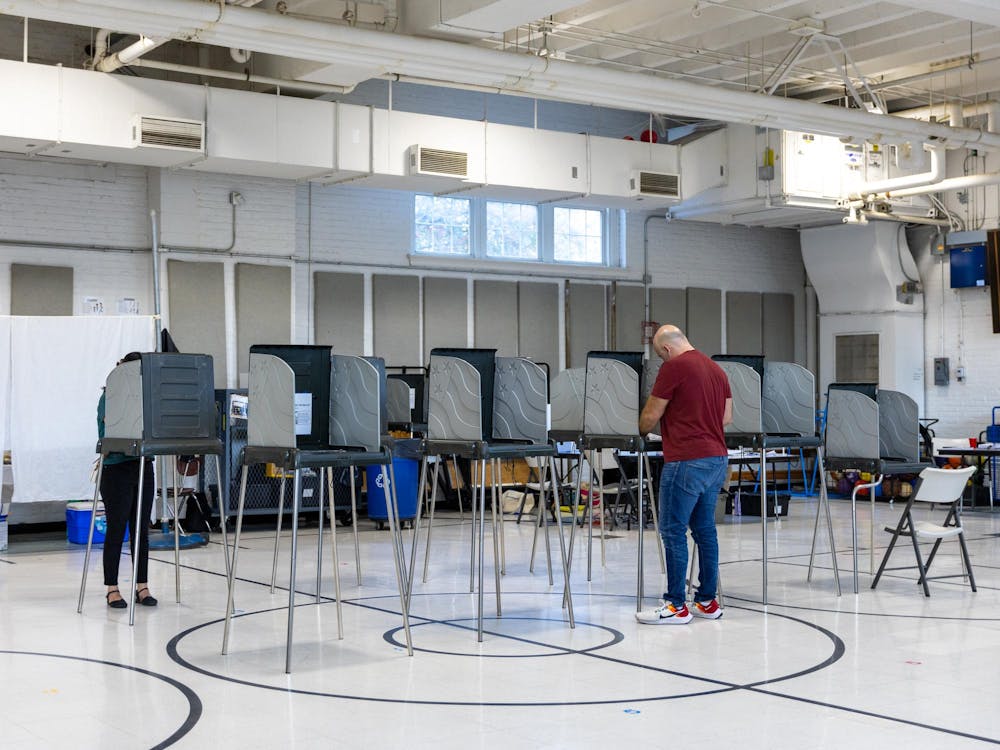Duke students who voted in Durham faced two bond referenda on the Nov. 5 ballot, which asked for their opinion on how tax dollars should be spent. But should they, as temporary residents of the city who often don’t pay property taxes, have a say in something they will likely be unaffected by?
The Chronicle spoke to professors from the Sanford School of Public Policy and a Duke student from Durham to hear their perspectives on the subject.
The Connecting Durham: 2024 Bond Referendum — which passed with an approval rate of over 70% — asked voters to decide if the city can borrow $85 million towards parks and recreation bonds and $115 in streets and sidewalks bonds. Together, the bonds will raise property taxes by 3.45 cents per $100 of assessed value, amounting to an annual cost of $104 for a property valued at $300,000.
The projects will be mostly incomplete by the time all current students graduate from Duke, with most of them beginning “within one-to-three years.”
Pope McCorkle, Law School ’84 and professor of the practice in the Sanford School, believes that the question of whether or not Duke students should vote on ballot referenda is an example of an “anomal[y] in elections and political theory.” He traced the issue back to the 18th century, when political theory dictated that voters needed to have an alleged stake in society by owning property.
However, McCorkle noted that this argument has been “defeated in a modern democratic wave.”
McCorkle made a distinction between Duke students voting on the bond referenda and on other local races, emphasizing that the people students vote for will be their representatives for a period of time, whereas the infrastructure projects will not be complete until many students have left Durham.
Eric Mlyn, distinguished faculty fellow in the Kenan Institute for Ethics and lecturer in the Sanford School, expressed a different view, drawing no distinction between different questions on the ballot. For Mlyn, as long as Duke students are legally registered to vote in North Carolina, the bond referenda are fair game.
“Everyone who is qualified to vote has the right to vote on everything on the ballot,” he said.
Mlyn emphasized that people vote on issues that may or may not have an impact on them “all the time.” He cited the example of people without children voting in the school board elections.
“Imagine if we started drawing lines and said, for example, that only women could vote on referendum dealing with abortion,” he said. “It would be a slippery slope that would really undermine democracy.”
First-year Ava Claar, a permanent Durham resident, believes Duke students should be able to vote on the bond referendum.
“This is their home also for the next four years,” she said, adding that she hopes Duke students did their “research before voting.”
According to the North Carolina State Board of Elections, college and university students may register in the county where they live while attending school if they do not intend to return back home after college or are unsure of where their future residence may be. However, the NCSBE notes that if students intend to return to their former home after graduation, they should register to vote there.
McCorkle described the language on the NCSBE’s website as a “pretty good ethical guide.” However, he emphasized that where to vote and how to vote should be left as a personal decision in the realm of ethics and should not be turned into law.
“If a student has taken the time to not register in their home state and register in North Carolina, it signals to me a little bit of a willingness to want to make an impact, especially in a state like North Carolina where it's kind of a swing state in terms of voting,” Claar said.
McCorkle stated that students should take the time to educate themselves about the bond referendum, noting that “the real problem underlying all of this is [people] vot[ing] on things [they] don’t know about.”
“The solution of trying to prevent Duke students [from] vot[ing] is probably worse than the problem,” he said.
Get The Chronicle straight to your inbox
Sign up for our weekly newsletter. Cancel at any time.
Mia Taubenblat is a Trinity first-year and a staff reporter for the news department.

